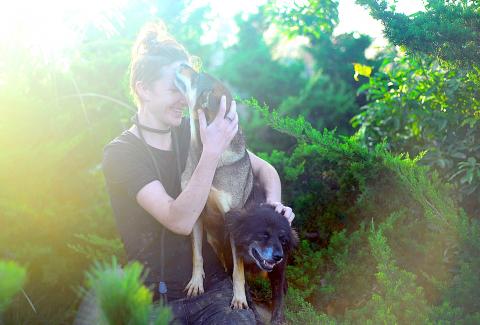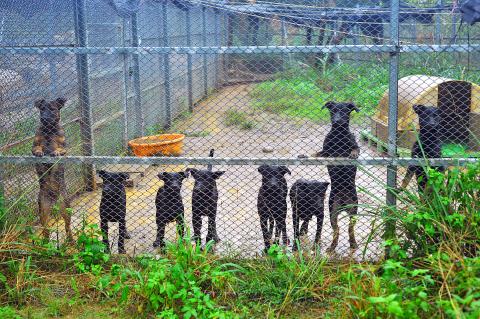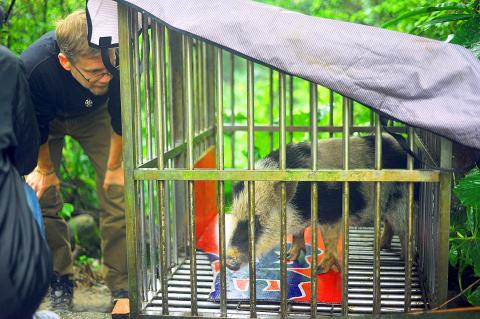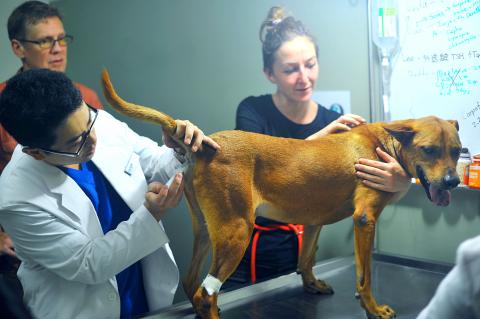Kevin Bacon was rescued two weeks ago from a roadside cage in New Taipei City.
He’s now resting and rehabilitating in a shipping container full of hay in the mountains near Taiwan’s north coast, eating proper meals and getting stronger by the day. Soon, he’ll be introduced to the other eight pigs who live at The PACK Sanctuary.
The operation to save Kevin’s bacon was the first ever joint venture between the Taiwan Society for the Prevention of Cruelty to Animals (TSPCA) and PACK, another step toward new director Tim Gorski’s goal to collaborate and build community with other animal welfare organizations in Taiwan.

Photo: Han Cheung, Taipei Times
“Until I stepped in to PACK, I felt there was kind of a competitive behavior among animal welfare groups in Taiwan,” Gorski says. “I realize we’re all competing for funds, but this is not a competition. These are our comrades in arms, fighting for the same animals we are.”

Gorski, an animal activist filmmaker who has worked with and built many shelters took over PACK after founder Sean McCormack’s departure in early August. With more than 400 animals, including about 370 dogs, the place is at full capacity and Gorski hopes to focus on fostering, adoptions and educating the public. He’s made other changes with the shelter such as having weekly visits from a veterinarian.
“We’re like a bucket under a leaky faucet that is pouring out neglected and abused animals,” Gorski says. “Sean built a very nice, great, happy bucket. But we have no more room to [expand]. The biggest problems lie within the pet industry. That’s the problem we need to address, and teach people what’s bad about puppy mills.”
ADOPT, DON’T SHOP
PACK staff were relieved last week as the government finally handed them their fundraising license. For the past four months, the shelter could only accept passive donations, making it difficult to cover its monthly operating costs of NT$1 million.

But despite trying to adopt out the animals, Gorski says the total number is increasing due to people leaving their dogs at the entrance. Tang Ming-hsiu (唐明秀), who is in charge of adoptions at PACK, says the adoption rate is slow at about three dogs per month.
She says people often have reservations about shelter animals because many of them are missing limbs or have emotional issues. Another problem is society’s preference for purebreds such as shibas, corgis and red poodles.

“The biggest issue, however, is the size of Taipei apartments,” she says. “People say they want to help, but they can only take a 5kg dog. That rules out 98 percent of our animals.”
Despite having so many animals, site manager Caroline Walshe and a handful of staff members personally feed the dogs every day. She knows most of the residents, which are mostly grouped by temperament in large fenced gardens with plenty of vegetation and shelter.
As an expat, Walshe initially didn’t want a dog, but she now has three from the shelter — Alice, who came emaciated, furless and covered in ticks; Scooby, who lost his tail and front paw in a trap; and Eva, who is old, blind and deaf.
She believes that in addition to education, the key to lifting adoption or fostering levels is to have people spend time with the dogs.
“You meet them and fall in love,” she says. “Nearly everyone here has a dog from this place.”
“If we can get 20 dogs fostered, that frees up two of these whole gardens,” Gorski says. “We can rotate dogs and build more of a house shelter so they’re also accustomed to living indoors. Otherwise they become semi-feral out here.”
Walshe welcomes the new changes. Before the veterinarians started visiting in early October, a lot of time was spent making vet runs to Taipei, which is one-hour each way.
“There’s nothing worse than someone leaving for the vet and five minutes later you have another dog,” she says. “We’re learning a lot too. They’re showing us how to clean wounds and identify parasites with a microscope.”
A trainer also visits the facility to teach staff and volunteers how to walk and train dogs. Gorski says that helps dogs and volunteers bond as well.
“Some volunteers might say, ‘I want to adopt this dog I’m really connecting with,’” Gorski says.
GOTTA CUT LOOSE
TSPCA director Connie Chiang (姜怡如) says they were not in contact with PACK before Gorski reached out a few months ago. Since TSPCA doesn’t have a shelter, they decided to start with joint rescues, with TSPCA sponsoring the animal and PACK housing it. This resulted in the case of Kevin Bacon, who was kept in a cage his whole life for the sole purpose of eating kitchen scraps since the garbage truck didn’t come by that address.
“Prior to this, we went online to look for fosters,” she says. “And it’s hard to find a pig sanctuary. We called some pig farms and they were all full.”
Chiang adds that they hope to do some joint educational campaigns as well.
Gorski and Claire Chen (陳其兒), who is in charge of education, outreach and events, have been making presentations about adopting and puppy mills at various schools and organizations. They hope that the students can visit PACK as volunteers and also help them spread the message to other students.
But reaching out to other organizations isn’t always as easy as it seems. Chen says she was turned down by a rescue animal halfway house, who told them they were already working with another group and “didn’t need this kind of collaboration.”
“I was kind of shocked,” she says. “You’re telling me that you don’t need support or even want to know what we’re trying to do?”
Last month’s endeavor to two Taichung shelters was more successful, to which PACK donated its excess towels.
“We share the same goals, but everyone is working on their own and that’s not enough,” Chen says. “We can share resources. We can share information. We need that right now in Taiwan.”

Dissident artist Ai Weiwei’s (艾未未) famous return to the People’s Republic of China (PRC) has been overshadowed by the astonishing news of the latest arrests of senior military figures for “corruption,” but it is an interesting piece of news in its own right, though more for what Ai does not understand than for what he does. Ai simply lacks the reflective understanding that the loneliness and isolation he imagines are “European” are simply the joys of life as an expat. That goes both ways: “I love Taiwan!” say many still wet-behind-the-ears expats here, not realizing what they love is being an

Every now and then, even hardcore hikers like to sleep in, leave the heavy gear at home and just enjoy a relaxed half-day stroll in the mountains: no cold, no steep uphills, no pressure to walk a certain distance in a day. In the winter, the mild climate and lower elevations of the forests in Taiwan’s far south offer a number of easy escapes like this. A prime example is the river above Mudan Reservoir (牡丹水庫): with shallow water, gentle current, abundant wildlife and a complete lack of tourists, this walk is accessible to nearly everyone but still feels quite remote.

It’s a bold filmmaking choice to have a countdown clock on the screen for most of your movie. In the best-case scenario for a movie like Mercy, in which a Los Angeles detective has to prove his innocence to an artificial intelligence judge within said time limit, it heightens the tension. Who hasn’t gotten sweaty palms in, say, a Mission: Impossible movie when the bomb is ticking down and Tom Cruise still hasn’t cleared the building? Why not just extend it for the duration? Perhaps in a better movie it might have worked. Sadly in Mercy, it’s an ever-present reminder of just

Google unveiled an artificial intelligence tool Wednesday that its scientists said would help unravel the mysteries of the human genome — and could one day lead to new treatments for diseases. The deep learning model AlphaGenome was hailed by outside researchers as a “breakthrough” that would let scientists study and even simulate the roots of difficult-to-treat genetic diseases. While the first complete map of the human genome in 2003 “gave us the book of life, reading it remained a challenge,” Pushmeet Kohli, vice president of research at Google DeepMind, told journalists. “We have the text,” he said, which is a sequence of